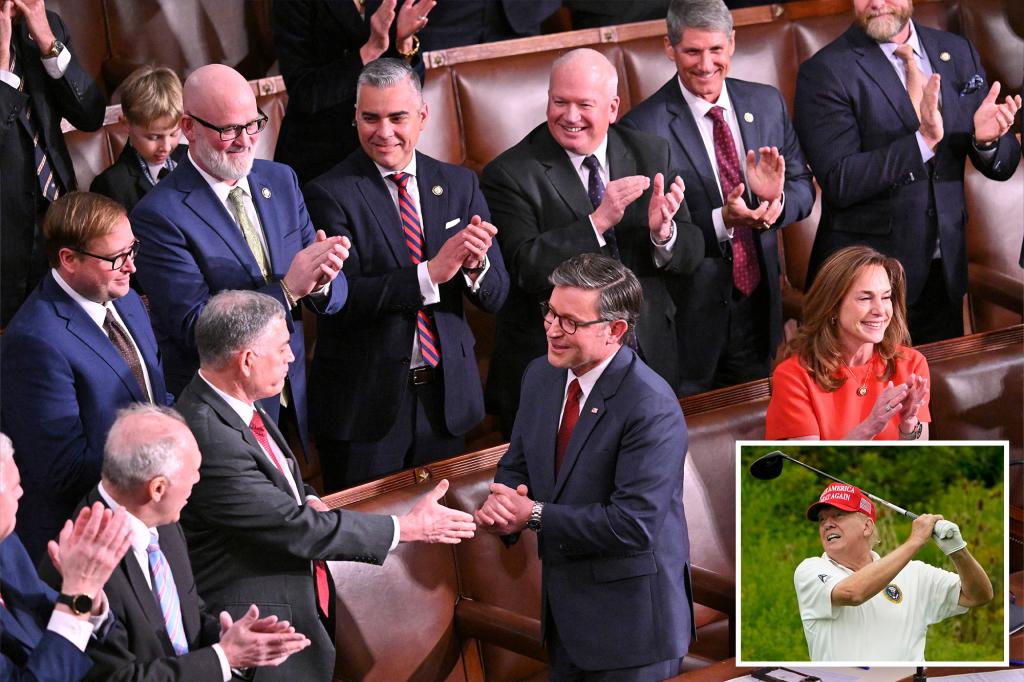The recent re-election of Mike Johnson as House Speaker unfolded with a touch of dramatic flair, thanks to the intervention of former President Donald Trump. The scene was set with a seemingly routine House vote, but the initial ballot revealed unexpected dissent within Republican ranks, threatening to derail Johnson’s anticipated smooth ascent. Three Republican representatives – Ralph Norman of South Carolina, Thomas Massie of Kentucky, and Keith Self of Texas – withheld their support for Johnson, casting their votes for alternative candidates. This unexpected turn of events prompted a flurry of behind-the-scenes maneuvering, culminating in a pivotal call from none other than Donald Trump himself.
The former president, reportedly in the middle of a round of golf, interrupted his game to personally lobby the dissenting Republicans. Representative Norman recounted his conversation with Trump, describing the initial exchange as somewhat casual, with Trump acknowledging his mid-game interruption. However, the underlying message was clear: Trump urged the holdouts to unify behind Johnson, emphasizing the importance of party cohesion and respect for the voters’ will. Trump’s appeal resonated with Norman, who ultimately switched his vote, citing his support for Trump’s endorsed candidate, Nikki Haley, as a motivating factor. The personal touch from the former president proved persuasive, and Norman assured Trump of his commitment to Johnson.
Trump’s intervention didn’t stop with a single phone call. He engaged with multiple holdouts, including Representative Self, emphasizing the negative optics of a protracted speaker election. He framed the continued dissent as not only disrespectful to the voters but also to himself, underscoring the importance of presenting a united front. Trump’s message, amplified by reports of his “disrespectful” remark, added a layer of urgency to the proceedings, effectively pressuring the wavering Republicans to reconsider their positions. The former president’s appeal to party unity and his personal stake in the outcome proved a potent combination, ultimately swaying two of the three dissenting votes.
The turning point came when Representative Nancy Mace facilitated a speakerphone conversation between Trump and the holdout Republicans. During the call, Trump directly addressed Representatives Norman and Self, reiterating his call for unity and emphasizing the need to move forward with the legislative agenda. He conveyed a sense of urgency, reminding the members of the tasks ahead and the importance of a swift resolution to the speaker vote. Trump’s direct engagement, coupled with his emphasis on the broader political implications, proved decisive, prompting both Norman and Self to switch their votes in favor of Johnson.
However, Representative Massie remained unmoved. Having publicly declared his unwavering opposition to Johnson’s speakership, he refused to budge despite Trump’s intervention. Massie’s steadfastness stood in stark contrast to the shifting allegiances of his colleagues, highlighting the complex interplay of personal convictions and political pressures within the Republican caucus. His refusal to succumb to Trump’s influence underscored the limits of the former president’s sway, even within his own party. While Trump’s calls managed to secure Johnson’s victory, Massie’s dissent served as a reminder of the persistent divisions within the GOP.
Following the successful vote, Trump celebrated Johnson’s victory on Truth Social, praising him as a great speaker and predicting a positive impact on the country. He framed Johnson’s leadership as a fulfillment of the people’s desire for common sense, strength, and leadership, suggesting that these qualities had been lacking in recent years. Trump’s congratulatory message further solidified his endorsement of Johnson, signaling a continuing effort to exert influence within the Republican Party. His optimistic pronouncements about Johnson’s leadership and the future of America under his speakership aimed to project an image of strength and unity, despite the earlier signs of internal dissent.
In the aftermath of the vote, further details emerged about Trump’s promises to the Republican holdouts. Representative Norman revealed that Trump had pledged to include conservative lawmakers like himself in policy negotiations, suggesting a quid pro quo for their support of Johnson. This revelation added another layer of complexity to the narrative, highlighting the transactional nature of political alliances and the role of behind-the-scenes deal-making in shaping legislative outcomes. The episode serves as a compelling illustration of the ongoing influence of Donald Trump within the Republican Party, his willingness to intervene directly in legislative affairs, and the intricate web of relationships and promises that drive political decision-making. It also underscores the challenges facing the Republican Party as it navigates internal divisions and seeks to maintain a unified front in the face of a demanding legislative agenda.

